- Home
- Farley Mowat
The Boat Who Wouldn't Float
The Boat Who Wouldn't Float Read online
Contents
Title Page
Dedication
Map
1 Conception
2 “Passion Flower” goes to sea
3 The sea-green bride
4 Farillon and Ferryland
5 Corsets, cod, and constipation
6 A pounce of pirates
7 Full speed astern
8 The Old Man earns his drink
9 T’place where t’fog is made
10 The foggy, foggy dew
11 The boys of Burin
12 A basking shark and a Basque proposal
13 With soul so pure
14 Itchy-Ass-Sally
15 Voyage of the Oregon
16 The game is played
17 Westward No!
18 Good-bye Messers
19 The alien shore
20 Hello Expo!
21 Envoi
Also by Farley Mowat
Copyright
For her friends who have
loved her despite her faults:
to Claire, Jack, Théo,
Peter, Albert, Andy, Angus,
Sandy, David, Peggy, John,
Dale, Don, and all the others—
but in particular to Mike Donovan
who will voyage no more
upon the unquiet waters.
1 Conception
I HAVE an ingrained fear of auctions dating back to the third year of my life. In that year my father attended an auction as a means of passing an aimless afternoon, and he came away from it the bewildered possessor of thirty hives of bees and all the paraphernalia of an apiarist. Unable to rid himself of his purchase he became, perforce, a beekeeper, and for the next two years I lived almost exclusively on a diet of soda biscuits and honey. Then the gods smiled on us and all the bees died of something called foul brood, enabling us to return to some semblance of a normal life.
Auctions remain associated in my subconscious mind with great catastrophes. I normally avoid them like the plague, but one April day not many years ago I too fell victim to the siren call. It happened in a sleepy little Lake Ontario town which once had been a major port for the great fleets of barley schooners that vanished forever shortly after the turn of the century. In that town there lived a ship-chandler who refused to accept the coming of steam and the death of sail, and who kept his shop and stock intact for half a century waiting for the day when a sailorman would again come knocking on his door. None did. He died, and his heirs decided to auction off the old man’s junk so they could turn the building into a pool hall.
I happened to be passing through that town on auction day accompanied by a young lady for whom I had conceived a certain passion. However her passion was primarily reserved for auctions. When she saw the auction sign she insisted that we attend. I steeled myself to buy nothing but as I stood in the dim and ancient store which was still redolent of stockholm tar, oilskins, and dusty canvas, something snapped within me.
Amongst the attitudes I acquired from my father was a romantic and Conradian predilection for the sea and ships. Like him I had often found surcease from the miseries I brought upon myself by spending hours immersed in books about the cruises of small boats to far-distant corners of the oceanic world. Ten years before the day of the auction I had anchored myself to a patch of eroded sand-hills in central Ontario about as far from the sea as a man could get. There I had laboured to make grass, trees, vegetables, and mine own self take root. My labours had been in vain. Drought killed the grass. Sawflies and rabbits girdled the trees. Wire-worms ate the vegetables. Far from rooting me into the Good Earth, a decade of servitude to the mingy soil only served to fuel a spirit of rebellion the intensity of which I had not begun to suspect until I stood in the old ship-chandler’s store physically surrounded by a world I had only previously known in the imagination.
I bought. I bought, and I bought, and I bought. I bought enough nautical gear out of another age to fill an outbuilding on my parched little farm. I am my father’s son; and so the story of the bees had to repeat itself to an inevitable conclusion.
It happens that I have a friend who is a publisher and who feels much the same way about the book business as I do about dirt farming. Jack McClelland is a romantic although he blanches at the word and vehemently denies it. During the war he served as skipper of M.T.B.’S (Motor Torpedo Boats) and other such small and dashing craft and although he returned at war’s end to the drabness of the business world, his spirit remained on the bridge of an M.T.B. streaking through the grey Atlantic wastes, guns blazing at the dim spectres of German E-boats hopelessly trying to evade their fates. Jack owns a cottage on the Muskoka Lakes and there he keeps an old-fashioned, knife-bowed, mahogany launch which in the dark of the moon sometimes metamorphoses into an M.T.B. to the distress of occasional lovers drifting on the still waters in canoes.
One night a few weeks after I bought the departed chandler’s stock, Jack McClelland and I were moored to a bar in Toronto. It was a dismal day in a dismal city so we stayed moored to the bar for several hours. I kept no notes of what was said nor do I recall with clarity how it all came to pass. I know only that before the night ended we were committed to buying ourselves an ocean-going vessel in which to roam the salt seas over.
We decided we should do things the old-fashioned way (we both have something of the Drake and Nelson complex) and this meant buying an old-fashioned boat; the kind of wooden boat that once was sailed by iron men.
The only place we knew where such a boat might be procured was in the remote and foggy island of Newfoundland. Consequently one morning in early May I flew off to that island’s ancient capital, St. John’s, where I had arranged to meet a red-bearded, coldly blue-eyed iconoclast named Harold Horwood who was reputed to know more about Newfoundland’s scattered little outport villages than any living man. Despite the fact that I was a mainlander, and Harold abhors mainlanders, he had agreed to help me in my quest. I am not sure why he did so but perhaps the unravelling of this chronicle will provide a hint.
Harold took me to visit scores of tiny fishing villages clinging like cold treacle to the wave-battered cliffs of the great island. He showed me boats ranging from fourteen-foot dories to the rotting majesty of a five-hundred-ton, three-masted schooner. Unfortunately, those vessels that were still sufficiently seaworthy to leave the wharf were not for sale, and those that could be had within my range (Jack had astutely placed a limit of a thousand dollars on the purchase price) were either so old and tired that piss-a-beds (the local name for dandelions) were sprouting from their decks, or they were taking a well-earned rest on the harbour bottom with only their upperworks awash.
Time was drawing on and we were no forwarder. Harold’s red beard jutted at an increasingly belligerent angle; his frosty eyes took on a gimlet stare and his temper grew worse and worse. He was not used to being thwarted and he did not like it. He arranged to have a news item printed in the papers describing the arrival of a rich mainlander who was looking for a local schooner.
Two days later he informed me that he had found the perfect vessel. She was, he said, a small two-masted schooner of the type known generally as a jack-boat and, more specifically, as a Southern Shore bummer. I can’t say that the name enthralled me, but by this time I, too, was growing desperate so I agreed to go and look at her.
She lay hauled out at Muddy Hole, a small fishing village on the east coast of the Avalon Peninsula—a coast that is rather inexplicably called the Southern Shore, perhaps because it lies south of St. John’s and St. John’s is, in its own eyes at least, the centre of the universe.
Tourist maps showed Muddy Hole as being connected to St. John’s by road. This was a typical Newfoundland “jolly.” Muddy Hole was no
t connected to St. John’s at all except by a tenuous trail which, it is believed, was made some centuries ago by a very old caribou who was not only blind but also afflicted with the staggers.
In any event it took us six hours to follow where he had led. It was a typical spring day on the east coast of the island. A full gale was blowing from seaward, hurling slanting rain heavily against the car. The Grand Banks fog, which is forever lurking just off the coast, had driven in over the high headlands obscuring everything from view. Guided by some aboriginal instinct inherited from his seagoing ancestors Harold somehow kept the course and just before ten o’clock, in impenetrable darkness, we arrived at Muddy Hole.
I had to take his word for it. The twin cones of the headlights revealed nothing but rain and fog. Harold rushed me from the car and a moment later was pounding on an unseen door. It opened to allow us to enter a tiny, brilliantly lit, steaming hot kitchen where I was introduced to the brothers Mike and Paddy Hallohan. Dressed in thick homespun sweaters, heavy rubber boots and black serge trousers they looked like a couple of characters out of a smuggling yarn by Robert Louis Stevenson. Harold introduced me explaining that I was the “mainland feller” who had come to see their boat.
The brothers wasted no time. Rigging me up in oilskins and a sou’wester they herded me out into the storm.
The rain beat down so heavily that it almost masked the thunder of breakers which seemed to be directly below me, and at no great distance away.
“ ’Tis a grand night fer a wreck!” Paddy bellowed cheerfully.
It was also a grand night to fall over a cliff and break one’s neck; a matter of more immediate concern to me as I followed close on Paddy’s heels down a steep path that was so slippery your average goat would have thought twice about attempting it. Paddy’s storm lantern, fuelled for economy reasons with crude cod-liver oil, gave only a symbolic flicker of light through a dense cloud of rancid smoke. Nevertheless the smoke was useful. It enabled me to keep track of my guide simply by following my nose.
Twenty minutes later I bumped heavily into Paddy and was bumped into as heavily by Mike who had been following close behind. Paddy thrust the lamp forward and I caught a maniacal glimpse of his gnome-like face, streaming with rain and nearly split in two by a gigantic grin.
“Thar she be, Skipper! T’foinest little bummer on t’Southern Shore o’ Newfoundland!”
I could see nothing. I put out my hand and touched the flank of something curved and wet. Paddy shoved the lantern forward to reveal reflections from the most repellent shade of green paint I have ever seen. The colour reminded me of the naked belly of a long-dead German corpse with whom I once shared a foxhole in Sicily. I snatched my hand away.
Mike roared in my ear. “Now dat you’se seen her, me dear man, us’ll nip on back to t’house and have a drop o’ tay.” Whereupon Mike and Paddy nipped, leaving me stumbling anxiously in their wake.
Safely in the kitchen once more I found Harold had never left that warm sanctuary. He later explained that he had felt it would have been an intrusion for him to be present at my first moment of communion with my new love. Harold is such a thoughtful man.
By this time I was soaked, depressed, and very cold; but the Hallohan brothers and their ancient mother, who now appeared from a back room, went to work on me. They began by feeding me a vast plate of salt beef and turnips boiled with salt cod which in turn engendered within me a monumental thirst. At this juncture the brothers brought out a crock of Screech.
Screech is a drink peculiar to Newfoundland. In times gone by it was made by pouring boiling water into empty rum barrels to dissolve whatever rummish remains might have lingered there. Molasses and yeast were added to the black, resultant fluid and this mixture was allowed to ferment for a decent length of time before it was distilled. Sometimes it was aged for a few days in a jar containing a plug of nigger-twist chewing tobacco.
However the old ways have given way to the new, and Screech is now a different beast. It is the worst conceivable quality of Caribbean rum, bottled by the Newfoundland government under the Screech label, and sold to poor devils who have no great desire to continue living. It is not as powerful as it used to be but this defect can be, and often is, remedied by the addition of quantities of lemon extract. Screech is usually served mixed with boiling water. In its consequent near gaseous state the transfer of the alcohol to the bloodstream is instantaneous. Very little is wasted in the digestive tract.
This was my first experience with Screech and nobody had warned me. Harold sat back with an evil glitter in his eye and watched with delight as I tried to quench my thirst. At least I think he did. My memories of the balance of that evening are unclear.
At a much later date I was to be accused by Jack of having bought our boat while drunk, or of having bought her sight unseen, or both. The last part of the accusation is certainly not true. As I sat in the overwhelming heat of the kitchen with steam rising to maximum pressure inside my own boilers, the brothers Hallohan drew on the wizardry of their Irish ancestors and conjured up for me a picture of their little schooner using such vivid imagery that I saw her as clearly as if she had been in the kitchen with us. When I eventually threw my arms around Paddy’s neck and thrust a bundle of bills into his shark-skin textured hand, I knew with sublime certainty that I had found the perfect vessel.
As we drove back to St. John’s the next morning Harold rhapsodized about the simple-hearted, honest, God-fearing Irish fishermen of the Southern Shore.
“They’d give you their shirt as soon as look at you,” he said. “Generous? Migod, there’s nobody in the whole world like them! You’re some lucky they took to you.”
In a way I suppose Harold was right. Because if the Hallohans had not taken to me I might have remained in Ontario where I could conceivably have become a solid citizen. I bear the Hallohans no ill will, but I hope I never again get “took to” the way I was taken on that memorable night at Muddy Hole.
Two days later I returned to Muddy Hole to do a survey on my vessel and to get my first sober (in the sense of calm, appraising) look at her. Seen from a distance she was indeed a pretty little thing, despite her nauseous colour. A true schooner hull in miniature, she measured thirty-one feet on deck with a nine-foot beam and a four-foot draft. But she was rough! On close inspection she looked as though she had been flung together by a band of our paleolithic ancestors—able shipbuilders perhaps but equipped only with stone adzes.
Her appointments and accommodations left a great deal to be desired. She was flush-decked, with three narrow fishing wells in each of which one man could stand and jig for cod, and with two intervening fish holds in each of which the ghosts of a million long-dead cod tenaciously lingered. Right up in her eyes was a cuddy two feet high, three feet wide, and three feet long, into which one very small man could squeeze if he did not mind assuming the foetal position. There was also an engine room; a dark hole in which lurked the enormous phallus of a single-cylinder, make-and-break (but mostly broke) gasoline engine.
Her rigging also left something to be desired. Her two masts had apparently been manufactured out of a couple of Harry Lauder’s walking sticks. They were stayed with lengths of telephone wire and cod line. Her sails were patched like Joseph’s coat and seemed to be of equivalent antiquity. Her bowsprit was hardly more than a mop handle tied in place with netting twine. It did not appear to me that the Hallohans had sailed her very much. I was to hear later that they had never sailed her and shared the general conviction of everyone in Muddy Hole that any attempt to do so would probably prove fatal.
She was not a clean little vessel. In truth, she stank. Her bilges had not been cleaned since the day she was built and they were encrusted with a glutinous layer of fish slime, fish blood, and fish gurry to a depth of several inches. This was not because of bad housekeeping. It was done “a-purpose” as the Muddy Holers told me after I had spent a solid week trying to clean her out.
“Ye see, Skipper,” one of them explained, �
�dese bummers now, dey be built o’ green wood, and when dey dries, dey spreads. Devil a seam can ye keep tight wit’ corkin (caulking). But dey seals dersel’s, ye might say, wit’ gurry and blood, and dat’s what keeps dey tight.”
I have never since had reason to doubt his words.
Since the sum the Hallohans had demanded for their vessel was, oddly enough, exactly the sum I had to spend, and since this nameless boat (the Hallohans had never christened her, referring to her only as She, or sometimes as That Bitch) was not yet ready to go to Samoa around Cape Horn, I had to make a serious decision.
The question really was whether to walk away from her forever, telling Jack McClelland a suitable lie about having been waylaid by highwaymen in St. John’s, or whether to try and brazen it out and somehow make a vessel out of a sow’s ear. Because I am essentially a coward, and anyway Jack is onto my lies, I chose the latter course.
Upon asking the Hallohans where I could find a boat-builder who could make some necessary changes for me I was directed to Enarchos Coffin—the very man who had built the boat four years earlier. Enos, as he was called, was a lean, lank, dehydrated stick of a man. In his younger days he had been a master shipwright in Fortune Bay building vessels for the Grand Banks fishery, but when the Banking fleet faded into glory he was reduced to building small boats for local fishermen. The boats he built were beautifully designed; but a combination of poverty amongst his customers, a shortage of decent wood, failing vision, and old age, somewhat affected the quality of his workmanship. The Hallohan boat was the last one he had built and was to be the last he would ever build.
When I went to visit him, armed with an appropriate bottle, he was living in a large, ramshackle house in company with his seven unmarried daughters. Enos proved amiable and garrulous. The Southern Shore dialect is almost unintelligible to the ear of an outsider and when it is delivered at a machine-gun clip it becomes totally incomprehensible. For the first hour or two of our acquaintance I understood not a single word he addressed to me. However after the first burst of speed had run its course he slowed down a little and I was able to understand quite a lot.

 Owls in the Family
Owls in the Family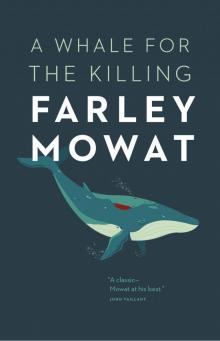 A Whale for the Killing
A Whale for the Killing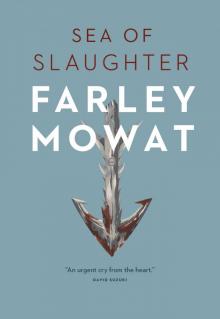 Sea of Slaughter
Sea of Slaughter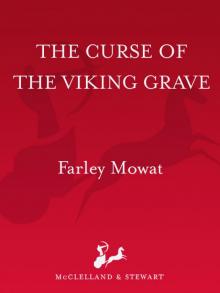 The Curse of the Viking Grave
The Curse of the Viking Grave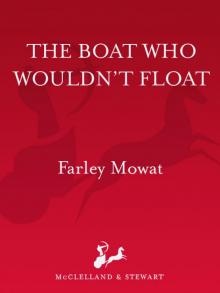 The Boat Who Wouldn't Float
The Boat Who Wouldn't Float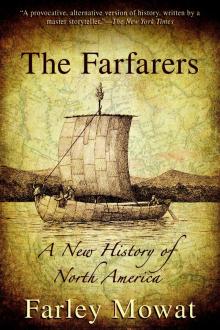 The Farfarers: Before the Norse
The Farfarers: Before the Norse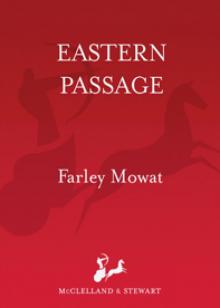 Memoir
Memoir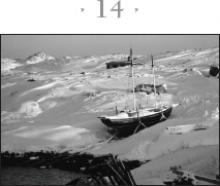 Bay of Spirits: A Love Story
Bay of Spirits: A Love Story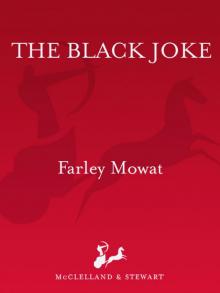 The Black Joke
The Black Joke Sibir: My Discovery of Siberia
Sibir: My Discovery of Siberia The Dog Who Wouldn't Be
The Dog Who Wouldn't Be Never Cry Wolf
Never Cry Wolf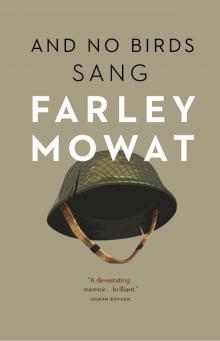 And No Birds Sang
And No Birds Sang The Snow Walker
The Snow Walker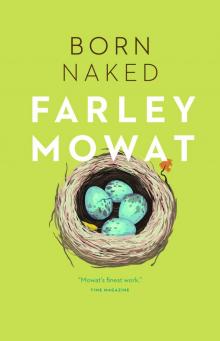 Born Naked: The Early Adventures of the Author of Never Cry Wolf
Born Naked: The Early Adventures of the Author of Never Cry Wolf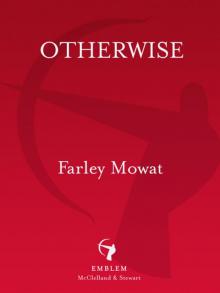 Otherwise
Otherwise Lost in the Barrens
Lost in the Barrens Gorillas in the Mist
Gorillas in the Mist People of the Deer
People of the Deer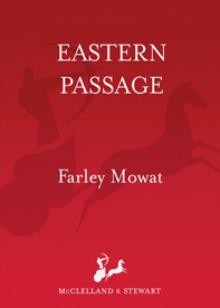 Eastern Passage
Eastern Passage Sibir
Sibir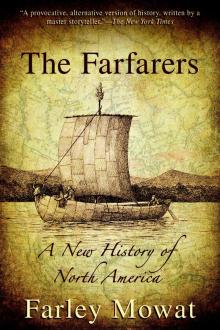 The Farfarers
The Farfarers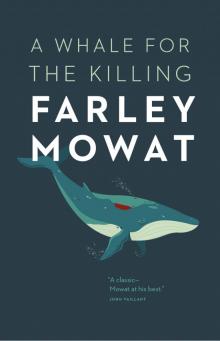 A Whale For The Killing (v5.0)
A Whale For The Killing (v5.0)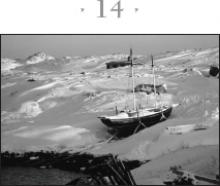 Bay of Spirits
Bay of Spirits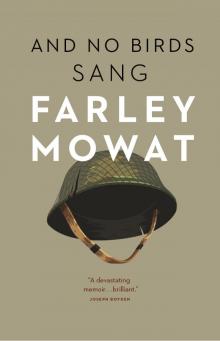 And No Birds Sang (v5.0)
And No Birds Sang (v5.0)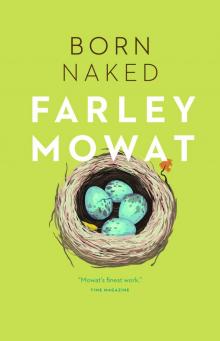 Born Naked
Born Naked